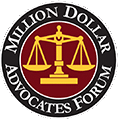Guillain-Barré Syndrome from Flu Shot

Home > Guillain-Barré Syndrome from Flu Shot
Guillain-Barré Syndrome from Flu Shot
- Menzer Law Group
Guillain-Barré Syndrome, or GBS, is a type of autoimmune disease. Specifically, it is a rare neurological disorder, affecting between 3,000 and 6,000 Americans every year.
When an individual develops GBS, the body begins to attack the peripheral nerves. This is because an inflammatory response begins to build once GBS develops.
The first signs of GBS are typically a tingling feeling in one’s extremities. Once the tingling and weakness develop, it may spread to the rest of the body, causing paralysis. Other symptoms may include:
- An inability to walk
- Trouble swallowing, chewing, speaking, or making facial movements
- Vision problems, such as double vision
- Incontinence
- Blood pressure changes
- Increased heart rate
- Trouble breathing
Individuals suffering from these symptoms should seek medical attention immediately. Using lumbar punctures and electromyography/nerve conduction studies, a healthcare provider can make a diagnosis of Guillain-Barré Syndrome.
These symptoms are typically most severe within the first 14 days of the disease. Generally, hospitalization is required to treat GBS.
Most individuals who are diagnosed with GBS recover their ability to walk by around six months after diagnosis. However, fatigue, numbness, or weakness may linger for some time.
Although the majority of GBS patients recover, the disease does have a mortality rate of up to 7 percent.
Types of Guillain-Barré Syndrome
There are three primary types of Guillain-Barré Syndrome.
Acute motor axonal neuropathy (AMAN) and acute motor-sensory axonal neuropathy (AMSAN) are usually reported outside of the United States, specifically in Mexico, Japan, and China.
Miller Fisher syndrome (MFS) is characterized by paralysis that first presents in the eyes. Unsteady walking is also a common symptom. Miller Fisher syndrome is usually seen in Asian countries.
Acute inflammatory demyelinating polyradiculoneuropathy (AIDP) is most commonly reported in Europe and North America. With AIDP, the muscle weakness usually starts at the bottom of one’s body and begins to travel upward.
Guillain-Barré Syndrome and Vaccines
Guillain-Barré Syndrome has been a hot topic in many news outlets lately, as some have reported the disease as an adverse event after receiving common vaccines.
For example, many individuals have suffered from GBS after receiving an influenza vaccination. In those individuals who developed GBS after a flu vaccine, the disease most often appears between 3 and 42 days after the injection. It is believed that in some individuals, the method by which the flu shot induces autoimmunity triggers GBS. Cases of Guillain-Barré Syndrome have been linked to several other vaccines including those containing the tetanus toxoid..
Reporting Reactions to Vaccines
The Food and Drug Administration and The Centers for Disease Control (CDC) jointly manage the Vaccine Adverse Event Reporting System or VAERS. This website allows individuals to report reactions they have had to vaccines. Medical professionals may also report adverse events, and vaccine manufacturers are required to report any adverse events of which they are aware.
VAERS was not created to identify causal relationships between vaccines and adverse events, but rather to detect patterns that may hint at risks caused by certain vaccines.
The National Vaccine Injury Compensation Program
The National Vaccine Injury Compensation Program, or NVICP, is a system that individuals may use to file claims against vaccine manufacturers or medical providers. It is a no-fault system that does not take negligence or other wrongdoing into account.
Rather than force individuals to use the court systems scattered throughout the United States to file claims, they may use a single system that ensures expeditious resolution of claims, as well as uniform filing requirements.
A vaccine injury table is published by the NVICP. This injury table lists vaccines and injuries and conditions that are often associated with those vaccines. If an individual wants to pursue a claim for a different type of injury (known as a non-table claim), that individual must present additional evidence linking the injury to the vaccine.
To recover any damages, the injured individual must show that the vaccine caused an injury or condition that lasted at least six months, required hospitalization or surgery, or caused a death.
What Causes Guillain-Barré Syndrome?
Medical professionals and scientific researchers are still unclear as to what exactly causes Guillain-Barré Syndrome. However, the majority of individuals who develop GBS note that they suffered some sort of infection in the previous six-week period. These may include a gastrointestinal infection or a respiratory illness.
Reports of Guillain-Barré Syndrome have been cited in those who had recently contracted:
- Influenza infection (flu)
- Epstein-Barr
- Zika virus
- COVID-19
- Campylobacter jejuni infection (noted as one of the most common risk factors)
Can Guillain-Barré Syndrome be cured?
Currently, there is no known cure for Guillain-Barré Syndrome. However, health care providers are able to treat its symptoms and shorten its overall duration.
How Do I File a Claim with the National Vaccine Injury Compensation Program if I Was Diagnosed with Guillain-Barre Syndrome Following a Vaccine?
The NVICP allows potential claimants to fill out forms online to begin the claims process. Claimants may file on behalf of themselves, their children, or disabled adults. However, the filing process can be complex and technical and the NVICP assists in covering attorneys fees and costs for claimants so it is likely the best course to retain an experienced vaccine attorney to assist you in bringing your claim.
The claim must be filed within three years of the illness or injury. If a death has occurred, the claimant has two years from the date of death, and four years from the date of the vaccine reaction.
If You Were Injured by a Vaccine, Contact Menzer Law Today
You should not be held responsible for thousands of dollars in medical bills if you were injured by a vaccine. At Menzer Law our personal injury attorneys are experienced in handling vaccine injury claims and know how to present undeniable evidence to ensure our clients receive the compensation they deserve. To learn more about our services in our Seattle, Washington office, contact us online or call 206.903.1818.
Recent Posts
These blogs may be of interest to you.
Menzer Law Group Releases Medical Malpractice Guide for Washington State
- by Menzer Law Group
- Menzer Law Group News and Updates, Medical Malpractice
What Happens if You’re Injured by an Uninsured Driver in Washington State?
- by Menzer Law Group
- Motor Vehicle Accidents
What to Do If You Suspect Neurosurgeon Malpractice in Washington State
- by Menzer Law Group
- Medical Malpractice
Taking Action
The aftermath of medical malpractice is often overwhelming, making timely legal consultation critical. If you or a loved one has been seriously injured due to medical negligence in Washington state, contact Menzer Law Group at (206) 903-1818 for a complimentary case review. It is important to act quickly because the statute of limitations in Washington sets a deadline for filing legal claims. Engaging a skilled medical malpractice attorney ensures your case is properly evaluated so that legal options can be explored.










































Complimentary Case Review
Our skilled team will carefully assess your claim to ensure it matches our areas of expertise and our focus on cases where we can have the most profound impact. We understand the stress and emotional and physical pain you may be experiencing, and we are committed to responding to you promptly and respectfully.
Trusted and Effective Legal Guidance When You Need it Most
At Menzer Law Group Group, our commitment to the well-being and recovery of our clients starts well before we step into the courtroom. We provide trusted and effective legal guidance every step of the way, ensuring that each phase of every client’s journey toward justice is handled with compassion and empathy. Our personalized approach and relentless advocacy demonstrate our dedication to achieving the best possible outcomes. By focusing on the legal claims and court proceedings, we enable our clients to concentrate on their recovery.




